Gabrielle - Movie Review
 Gabrielle 2005
Gabrielle 2005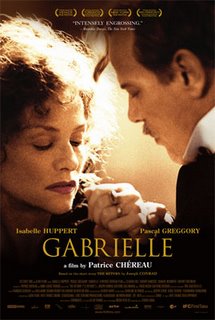 One of the most frustrating aspects of being a talented actor is knowing that no matter how many varied roles you play in your long career, you will always be typecast. Isabelle Huppert is one of France’s greatest actresses, and an international star. She has worked in various languages; garnered top acting honors at the Berlin & Venice Film Festivals, is one of only three actors to have won two acting prizes from the Cannes Film Festival and holds the record with thirteen César acting nominations (France’s equivalent to the Oscars). And through it all, she has become known as the woman behind the iron mask.
One of the most frustrating aspects of being a talented actor is knowing that no matter how many varied roles you play in your long career, you will always be typecast. Isabelle Huppert is one of France’s greatest actresses, and an international star. She has worked in various languages; garnered top acting honors at the Berlin & Venice Film Festivals, is one of only three actors to have won two acting prizes from the Cannes Film Festival and holds the record with thirteen César acting nominations (France’s equivalent to the Oscars). And through it all, she has become known as the woman behind the iron mask.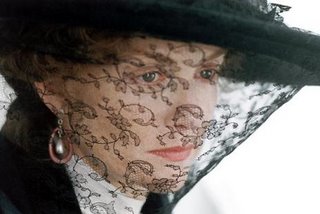 Her pale freckled complexion, light auburn hair and chiseled countenance are not the typical cinematic memory we have of French actresses. Isabelle Huppert has always come across as a being carved from ice: all tightly wound nerves, hiding behind a mask of impassiveness. But do not be fooled by her cool demeanor and stately reserve, for beneath that mask Isabelle Huppert is also an actress of incomparable range and artistry. Her stellar work in Claude Chabrol’s powerful “Une Affaire de Femmes” is one for the ages, and should be required viewing for acting students.
Her pale freckled complexion, light auburn hair and chiseled countenance are not the typical cinematic memory we have of French actresses. Isabelle Huppert has always come across as a being carved from ice: all tightly wound nerves, hiding behind a mask of impassiveness. But do not be fooled by her cool demeanor and stately reserve, for beneath that mask Isabelle Huppert is also an actress of incomparable range and artistry. Her stellar work in Claude Chabrol’s powerful “Une Affaire de Femmes” is one for the ages, and should be required viewing for acting students.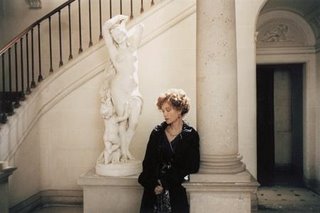 Sadly, most American moviegoers either know her for her participation in one of the most famous of all cinematic flops, Michael Cimino’s “Heaven’s Gate” or her recent over the top comic trip through David O. Russell’s “I ♥ Huckabees”. (Now, while we won’t recommend that last flick to our faithful readers, it was one of those incomprehensible films that had us laughing our asses off. But then again, any good parody of existentialist psychoanalysis will do that for us.)
Sadly, most American moviegoers either know her for her participation in one of the most famous of all cinematic flops, Michael Cimino’s “Heaven’s Gate” or her recent over the top comic trip through David O. Russell’s “I ♥ Huckabees”. (Now, while we won’t recommend that last flick to our faithful readers, it was one of those incomprehensible films that had us laughing our asses off. But then again, any good parody of existentialist psychoanalysis will do that for us.)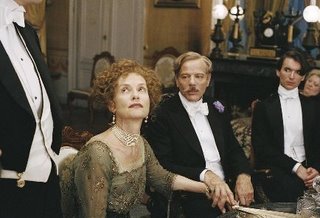 “Gabrielle” is an adaptation of the short story, “The Return” by Joseph Conrad. It tells the simple story of a well to do couple who have been married for several years, are the toast of the intellectual artiste crowd, are famed for their weekly salons and are hopelessly removed from each other emotionally. While we simply cannot begin to imagine a married couple being emotionally distant from each other, we should pause to mention that this is also a period flick set in the turn of the century past. The husband, Jean has grown accustomed to his lavish lifestyle and is quite content with his “impassive” wife, whose beauty and intelligence help maintain his envied position amongst his elite circle.
“Gabrielle” is an adaptation of the short story, “The Return” by Joseph Conrad. It tells the simple story of a well to do couple who have been married for several years, are the toast of the intellectual artiste crowd, are famed for their weekly salons and are hopelessly removed from each other emotionally. While we simply cannot begin to imagine a married couple being emotionally distant from each other, we should pause to mention that this is also a period flick set in the turn of the century past. The husband, Jean has grown accustomed to his lavish lifestyle and is quite content with his “impassive” wife, whose beauty and intelligence help maintain his envied position amongst his elite circle.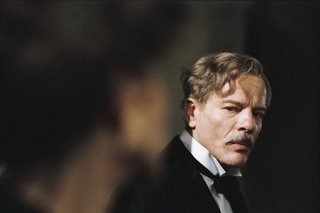 But this being the movies, and this being based on a Conrad piece, happiness does not last that long. One afternoon, the successful and quite dapper husband returns to his lavish mansion to find a note from his wife. She has left him. He is devastated. His envied position in society is about to collapse as he realizes that he is being made a cuckold. He can barely maintain decorum in front of the servants as he attempts to process the pain and humiliation. And just when it seems the most unbearable, a miraculous thing occurs. His wife returns. That very afternoon.
But this being the movies, and this being based on a Conrad piece, happiness does not last that long. One afternoon, the successful and quite dapper husband returns to his lavish mansion to find a note from his wife. She has left him. He is devastated. His envied position in society is about to collapse as he realizes that he is being made a cuckold. He can barely maintain decorum in front of the servants as he attempts to process the pain and humiliation. And just when it seems the most unbearable, a miraculous thing occurs. His wife returns. That very afternoon.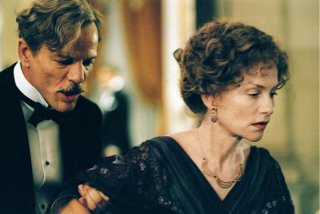 What happens next is the heart and soul of the piece, with husband and wife attempting to understand their separate positions along the barriers they have erected over the years. Jean is furious and demands a full explanation. Gabrielle is reticent and fully aware of the havoc she has wrought.
What happens next is the heart and soul of the piece, with husband and wife attempting to understand their separate positions along the barriers they have erected over the years. Jean is furious and demands a full explanation. Gabrielle is reticent and fully aware of the havoc she has wrought. While this may have played out as a quiet and controlled chamber piece, the amazingly nuanced and explosive performances by the two leads keep us completely riveted. The director, Patrice Chéreau is also not one to tread lightly and delicately through this marital maze. What makes this film truly wonderful is the brazen modern flourishes he overlays upon the period trappings.
While this may have played out as a quiet and controlled chamber piece, the amazingly nuanced and explosive performances by the two leads keep us completely riveted. The director, Patrice Chéreau is also not one to tread lightly and delicately through this marital maze. What makes this film truly wonderful is the brazen modern flourishes he overlays upon the period trappings.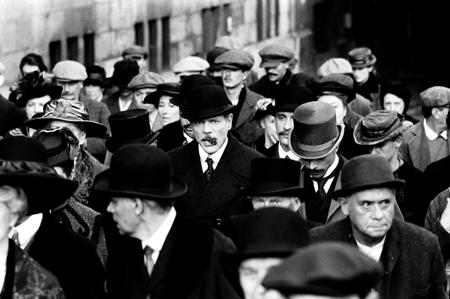 The film and each movement of the piece (and the flick is divided into movements, much like a symphony – more on this later) begins in crisp, lovely Black & White. As each key scene progresses, the film turns into full realized Color, drawing us in visually to the emotional carnage. Mr. Chéreau is also not afraid to use a few quick editing tricks and swooping camerawork to capture the upheaval amidst the stately décor. When the husband opens the letter that will change his life forever, there is no narration or quiet shot over his shoulder to let us know the exact wording. Instead, the director plasters the words across the screen in a bold surtitle effect that jolts us out of the action completely.
The film and each movement of the piece (and the flick is divided into movements, much like a symphony – more on this later) begins in crisp, lovely Black & White. As each key scene progresses, the film turns into full realized Color, drawing us in visually to the emotional carnage. Mr. Chéreau is also not afraid to use a few quick editing tricks and swooping camerawork to capture the upheaval amidst the stately décor. When the husband opens the letter that will change his life forever, there is no narration or quiet shot over his shoulder to let us know the exact wording. Instead, the director plasters the words across the screen in a bold surtitle effect that jolts us out of the action completely.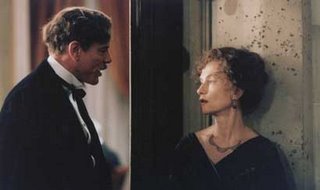 For a lesser director, it would have failed. But this daring move, repeated later at a crucial moment is just the right modern touch to bear. But billboard sized declarations are not the only trick up Patrice’s sleeve. The other is the use of music. When we mentioned that this piece echoes the structure of a symphony, we weren’t kidding! The music is incredible. At turns rhapsodic, elegiac, bombastic and later thundering – it is the most operatic like use of a musical score in a non-musical that we have seen since Jean-Luc Godard entranced us with his own candy colored examination of relationships way back in 1961 with “Une Femme et Une Femme”. (What a great whacked out flick that is, go rent the lovely Criterion DVD right now!)
For a lesser director, it would have failed. But this daring move, repeated later at a crucial moment is just the right modern touch to bear. But billboard sized declarations are not the only trick up Patrice’s sleeve. The other is the use of music. When we mentioned that this piece echoes the structure of a symphony, we weren’t kidding! The music is incredible. At turns rhapsodic, elegiac, bombastic and later thundering – it is the most operatic like use of a musical score in a non-musical that we have seen since Jean-Luc Godard entranced us with his own candy colored examination of relationships way back in 1961 with “Une Femme et Une Femme”. (What a great whacked out flick that is, go rent the lovely Criterion DVD right now!)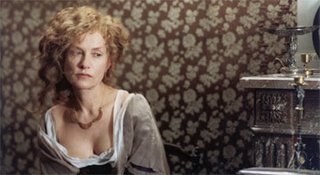 If it were only for the stylistic flourishes that Mr. Chéreau brings to the piece, you would be better off staying home and watching video clips from a vintage Les Rita Mitsouko video. But the film positively soars on the shoulders of Isabelle Huppert and Pascal Greggory. These two brilliant actors capture every single detail of a marriage that has fallen apart, and the psychological torture the couple has embarked upon in order to reach their final resolve. These are the best two performances so far this year. It was a true honor to bask in their powerhouse acting.
If it were only for the stylistic flourishes that Mr. Chéreau brings to the piece, you would be better off staying home and watching video clips from a vintage Les Rita Mitsouko video. But the film positively soars on the shoulders of Isabelle Huppert and Pascal Greggory. These two brilliant actors capture every single detail of a marriage that has fallen apart, and the psychological torture the couple has embarked upon in order to reach their final resolve. These are the best two performances so far this year. It was a true honor to bask in their powerhouse acting.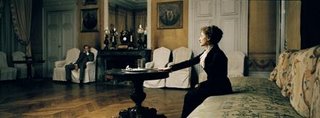 What the hell are you waiting for? Drop what you’re doing and go spend some time in the dark in the terrific company of Isabelle Huppert, Pascal Greggory and Patrice Chéreau. It is a wonderful film and a dazzling display of talent. You can thank us later. Bless you all!
What the hell are you waiting for? Drop what you’re doing and go spend some time in the dark in the terrific company of Isabelle Huppert, Pascal Greggory and Patrice Chéreau. It is a wonderful film and a dazzling display of talent. You can thank us later. Bless you all!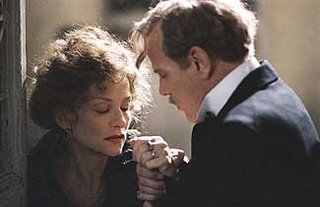 Directed by Patrice Chéreau
Directed by Patrice ChéreauWritten by Patrice Chéreau & Anne-Louise Trividic
Based on “The Return” by Joseph Conrad
Starring
Isabelle Huppert as Gabrielle Hervey
Pascal Greggory as Jean Hervey
Claudia Coli as Yvonne
Thierry Hancisse as Le rédacteur en chef
Chantal Neuwirth as Madeleine
Raina Kabaivanska as La cantatrice
Cinematography by Eric Gautier
Film Editing by François Gédigier
Original Music by Fabio Vacchi
Production Design by Olivier Radot
Costume Design by Caroline de Vivaise


0 Comments:
Post a Comment
<< Home